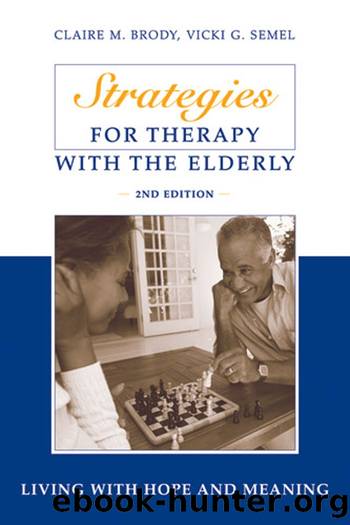Strategies for Therapy with the Elderly by Brody Claire;Semel Vicki;

Author:Brody, Claire;Semel, Vicki;
Language: eng
Format: epub
Publisher: Springer Publishing Company, Incorporated
Published: 2011-06-29T00:00:00+00:00
Because people are living longer and their grandchildren are having fewer children, an imbalance will ultimately take place between the number of family members able to assume the caregiving role and the number of seniors who need to be cared for. Our government may eventually have to assume more responsibility for seniors by establishing more extensive facilities, agencies, and services to satisfy their basic needs.
Today, most elderly who live at home are cared for by their children. Such caregiving is generally voluntary and based on love, devotion, obligation, or some combination thereof. Currently, 26 states have statutes that consider it adult childrenâs duty to provide for their indigent parents (Maker, 1999, para 7). By law, once the obligation of caregiving has been assumed, it must be continued. âIn New Jersey, any person who has assumed continuing responsibility for the care of an elderly person is subject to criminal liability for the neglect of such person. The crime in New Jersey is one of the third degreeâ (New Jersey Stats Ann. 1995 § 2c:24-8 [para 7]).
The pressures of caregiving often take their toll. A gamut of emotions is aroused by the caregiving role, from loving and nurturing affection to murderous rage. It is natural to experience all kinds of feelings. Many individuals have been trained to suppress their negative emotions. Not only do they find them difficult to discuss, but also they can scarcely acknowledge even to themselves that they are experiencing them. Seeing a therapist and/or being involved in a group with other caregivers can be very helpful. Hearing others express their joy, their rage, their sadness and grief, their fear and worry, their fatigue and isolation, can be inspiring and validating (Clark & Weber, 1997).
When the end approaches and an elderly parent slips into the final hours or days of letting go, the toll on the caregiver is usually great. He or she may be flooded with many feelings. These feelings are often mixed: a combination of loss, anger, grieving, love, and possibly a strong feeling of relief and release from the tether of a connection that has become besieged with the struggle of illness or the gradual relinquishing of life. A full description of caregiversâ reactions and the actual physical aspects of dying are clearly noted in an excellent book called How to Care for Aging Parents by Virginia Morris (1996) and her more recent ones published in 2001. The kaleidoscope of emotions in the caregiving role for all of its challenge and pain can also result in great pleasure and a sense of renewed bonding. One caregiver, Denise, relates her story (both negative and positive aspects):
My mother does not say that much. She has never been that demonstrative. Sometimes, when she takes my arm to walk or when she places her hand on mine, she will say, âWhat would I do without you?â It is a sense of connectedness that is warming to me. It also leaves me with the feeling, âMore, I want more.â Although in
Download
This site does not store any files on its server. We only index and link to content provided by other sites. Please contact the content providers to delete copyright contents if any and email us, we'll remove relevant links or contents immediately.
Unwinding Anxiety by Judson Brewer(72056)
The Art of Coaching by Elena Aguilar(52246)
The Fast Metabolism Diet Cookbook by Haylie Pomroy(20929)
Rewire Your Anxious Brain by Catherine M. Pittman(18337)
Healthy Aging For Dummies by Brent Agin & Sharon Perkins RN(16933)
Talking to Strangers by Malcolm Gladwell(12915)
The Art of Thinking Clearly by Rolf Dobelli(9951)
Crazy Rich Asians by Kevin Kwan(8912)
Mindhunter: Inside the FBI's Elite Serial Crime Unit by John E. Douglas & Mark Olshaker(8750)
The Compound Effect by Darren Hardy(8542)
Periodization Training for Sports by Tudor Bompa(7946)
Becoming Supernatural by Dr. Joe Dispenza(7867)
Tools of Titans by Timothy Ferriss(7850)
Wonder by R. J. Palacio(7755)
Crystal Healing for Women by Mariah K. Lyons(7734)
Bodyweight Strength Training by Jay Cardiello(7686)
Therapeutic Modalities for Musculoskeletal Injuries, 4E by Craig R. Denegar & Ethan Saliba & Susan Saliba(7605)
Should I Stay or Should I Go? by Ramani Durvasula(7440)
Change Your Questions, Change Your Life by Marilee Adams(7405)
